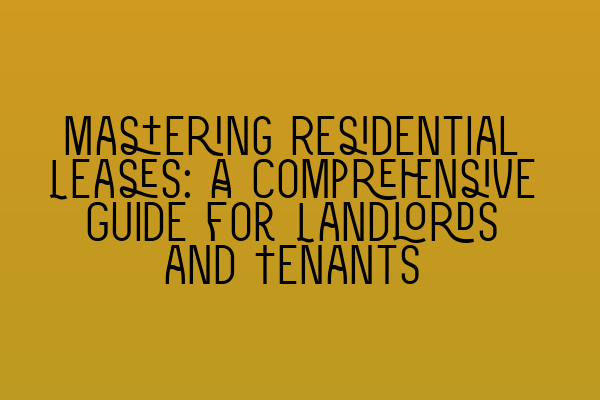Mastering Residential Leases: A Comprehensive Guide for Landlords and Tenants
Welcome to our comprehensive guide on mastering residential leases for landlords and tenants. Whether you are a seasoned property owner or a first-time renter, understanding the ins and outs of residential leases is crucial to ensuring a smooth and hassle-free tenancy. In this guide, we will cover everything you need to know about residential leases, from their purpose and components to common clauses and legal considerations.
What is a Residential Lease?
A residential lease, also known as a rental agreement or tenancy agreement, is a legally binding contract between a landlord and a tenant. It outlines the terms and conditions of the rental arrangement, including the rights and responsibilities of both parties. A well-drafted lease provides clarity and protection for both landlords and tenants, setting clear expectations and guidelines for the tenancy period.
Before we delve into the details, it’s essential to be aware of recent updates in UK property laws. Understanding the evolving legal landscape ensures that you comply with the latest regulations and make informed decisions. To learn more about key changes and implications in property laws, check out our article on Updates in UK Property Laws: Key Changes and Implications.
The Components of a Residential Lease
A residential lease typically includes several key components:
- Parties: The lease identifies the landlord(s) and tenant(s) involved in the agreement.
- Property Description: It provides a detailed description of the rented property, including its address and any specific features or limitations.
- Term: The lease specifies the duration of the tenancy, whether it’s a fixed-term lease or a periodic tenancy.
- Rent: The amount of rent, payment frequency, and acceptable payment methods are outlined in the lease.
- Deposits: Information regarding security deposits, including the amount, purpose, and conditions for its return, should be clearly stated.
- Repairs and Maintenance: The responsibilities for repairs, maintenance, and cleanliness of the property are defined in the lease.
- Utilities and Services: The lease should specify which utilities and services are included in the rent and which are the tenant’s responsibility.
- Restrictions: Any restrictions, such as pet policies or limitations on alterations to the property, should be clearly stated.
- Termination: The conditions under which the lease can be terminated by either party should be outlined, including notice periods and penalties.
- Dispute Resolution: The lease may include a clause detailing the procedures for resolving disputes between the landlord and tenant.
For a more comprehensive understanding of the intricacies involved in property transactions, don’t miss our in-depth guide on Legal challenges in property transactions: A comprehensive guide.
Common Clauses in Residential Leases
Residential leases often contain additional clauses that address specific situations and provide further protection for both parties. Some common clauses you might encounter include:
- Right of Entry: This clause stipulates the landlord’s right to enter the property for purposes such as inspections or repairs.
- Subletting: If subletting is allowed, the lease should outline the requirements and procedures for subletting the property.
- Renewal: If the lease offers the option to renew at the end of the term, this clause details the renewal process and any changes in rent or terms.
- Insurance: The lease may require the tenant to obtain renter’s insurance to protect their personal belongings.
- Assignment: This clause explains the circumstances under which the tenant can assign the lease to another party.
- Alterations: If alterations to the property are permitted, this clause outlines the conditions and requirements for making changes.
To navigate lease laws in the UK more effectively and to ensure a mutually beneficial relationship, we highly recommend reading our comprehensive guidelines for tenants and landlords in our article on Navigating Lease Laws in the UK: Essential Guidelines for Tenants and Landlords.
Legal Considerations for Residential Leases
While residential leases serve as valuable tools for establishing and maintaining tenancies, it is important to be aware of certain legal considerations.
- Tenancy Agreements: In some cases, short-term tenancies may not require a formal lease agreement; however, it is always advisable to have a written agreement in place to protect the rights of both parties.
- Unfair Contract Terms: Certain terms in a lease might be considered unfair or unenforceable under consumer protection laws. It is crucial to ensure that your lease adheres to fair and reasonable terms.
- Tenant Rights: Tenants have various legal rights, including the right to live in a property that is safe and in good repair. Landlords must comply with these rights to avoid legal disputes.
- Notice Periods: The lease should clearly state the required notice periods for terminating the tenancy. These periods may vary depending on the type and length of the tenancy.
- Consent: If the tenant wishes to make alterations, keep pets, or engage in any activities outside of the lease agreement, it is essential to seek the landlord’s written consent.
For expert advice on avoiding common pitfalls and dominating property law questions, check out our informative article on Dominate Property Law Questions: Avoiding Common Pitfalls.
Conclusion
Mastering residential leases is crucial for both landlords and tenants. By understanding the components, common clauses, and legal considerations, you can ensure a harmonious tenancy and avoid potential disputes. If you’re studying for property law exams, don’t forget to explore our invaluable tips on Land Law Revision Tips: Ace Your Exam Preparation.
At SQE Property Law & Land Law, we have a team of experienced solicitors ready to assist landlords and tenants with their legal needs. If you require professional advice or assistance with residential leases or any other property law matters, don’t hesitate to contact us.
